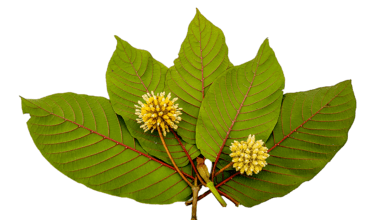
What is Kratom & Where is it Legal?
Published on 5/9/21
Kratom (recognized in the scientific community as Mitragyna speciosa Korth and pronounced KRAY-tem) is an evergreen tree native to countries in Southeast Asia like Indonesia, Malaysia, Thailand, the Philippines and New Guinea, and has been used by the local populations for centuries. Much like betel leaves, the extract from the leaves of the tree is known as a natural stimulant with potential psychoactive properties. It is also cheap and easily accessible.
There are two compounds in kratom leaves - mitragynine and 7-alpha-hydroxymitragynine - that engage with opioid receptors in the brain and cause feelings of pleasure and a decrease in physical pain. Mitragynine is also the cause of the stimulating effect. Farmers and laborers have traditionally enjoyed kratom benefits like increased energy and productivity and have also used the leaves to help curb diarrhea and assist with opioid withdrawal. It is also popular for addressing menstrual cramps and as an appetite suppressant. Those who ingest significant amounts of kratom report feelings of euphoria and very large amounts can result in a sedative-like experience.
Kratom capsules and powder have recently become more popular in North America and Europe as consumers lock into the latest fad in the world of natural stimulants and potential mind-altering substances.
Is Kratom Legal?
 Unsplash
UnsplashKratom inhabits a fascinating niche that spans federal, state and local laws. The U.S. Federal Government does not currently have any restrictions on the sale or use of kratom. There are, however, several states and cities that have enacted their own bans on kratom products, often in contrast with the immediate surrounding area. For example, kratom is legal in California but banned in San Diego. It is legal in Illinois but banned in Jerseyville City. It is legal in Florida but verboten in Sarasota County. In Colorado, Denver prohibits the sale for human consumption, and the towns of Parker and Monument prohibit kratom sales completely. Kratom is illegal in Alabama, Arkansas, Indiana, Rhode Island, Vermont and Wisconsin, as well as several counties and cities in Mississippi.
Meanwhile, up north in Canada, the situation is also confusing. Kratom is widely sold and readily available in stores and online, but the Canadian Food Inspection Agency (CFIA) and Health Canada consider the sale of Kratom for consumption to be illegal. This is rarely (if ever) enforced by Canadian police.
If you are interested in trying kratom, your best bet is to Google "Kratom near me" and see what pops up.
How is Kratom Consumed?
Indigenous populations have historically cut the leaves from the tree and chewed them after removing the veins. These days, most people take Kratom as a pill or capsule. Kratom powder and kratom tea are also popular. The powder is often mixed into drinks like orange juice or simply spooned into the mouth and chased with water or any other drink. Kratom tinctures, extracts and resins are also becoming popular due to their concentrated form and increased strength.
Negative Kratom Side Effects
 Unsplash
UnsplashThe list of what users might experience is lengthy. Possible Kratom effects include:
- Anxiety and/or Depression
- Agitation and/or Aggression
- Confusion
- Constipation and/or Urination Issues
- Dizziness
- Drowsiness
- Dry mouth
- High blood pressure
- Itching
- Loss of Appetite and Weight Loss
- Muscle Pain
- Nausea and/or Vomiting
- Rapid Heartbeat
- Sweating and/or Chills
Critics of Kratom have valid concerns about its safety. In 2017, according to a study published in 2019 in the journal Clinical Toxicology, there were 682 kratom-related calls to U.S. poison control centers. Between July 2016 and December 2017 almost 100 people died of overdoses in which kratom was involved in some manner (usually mixed with other drugs like fentanyl), with seven deaths listed as kratom-only incidents. The fear in the scientific and public health communities is the lack of knowledge about how kratom interacts with other substances.
Is Kratom Addictive?
In a similar manner to opioids and other drugs that provide opioid-like effects, kratom can cause physical and mental dependence, primarily due to the release of serotonin and its energy-providing properties. This means that kratom withdrawal is not uncommon. Those who report being addicted to the substance describe withdrawal symptoms that include:
- Aggression
- Emotional Instability
- Hostility
- Insomnia
- Irritability
- Muscle Aches
At the moment there is no known treatment for kratom addiction. Cognitive and behavioral therapy have proven to be helpful for some patients but there is currently no pharmaceutical treatment that can be prescribed.
It is essential that if you are interested in engaging with kratom that you speak with your doctor or another health care professional prior to taking it. As noted above, the lack of research, knowledge and understanding about how kratom interacts with the body or other medications that you might be taking is substantial and the risks are real.
Have you tried kratom? What made you decide that it might be beneficial? Was it for a specific ailment or just for fun? How did it interact with your body and how did it make you feel? Let us know in the comments section below!









